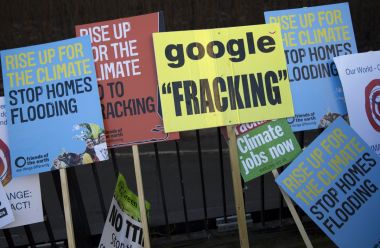Anglican bishops call for divestment from fossil fuels

Climate change is an "unprecedented crisis" and the Church must divest from fossil fuels as soon as possible, a group of influential Anglican bishops has said.
In a declaration entitled 'The World Is Our Host: A Call to Urgent Action for Climate Justice' released yesterday, the bishops – including the Bishop of Salisbury, Rt Revd Nicholas Holtam – call for a review of the Church's investment practices "with a view to supporting environmental sustainability and justice by divesting from industries involved primarily in the extraction or distribution of fossil fuels."
"At this time of unprecedented climate crisis, we call all our brothers and sisters in the Anglican Communion to join us in prayer and in pastoral, priestly and prophetic action," the declaration reads.
"We call with humility, but with urgent determination enlivened by our faith in God who is creator and redeemer and by the pain of our people's experience in our dioceses and provinces, and their need for seeds of hope."
The bishops, representing all six continents, ask for God's forgiveness for "the greed which exploits the work of human hands and lays waste the earth" and the "covetous desires of people and nations to possess what is not their own".
They argue that the Church's responsibility to care for creation has been ignored for too long, and "the truth of the redemption of all things in Christ, which is the message of the life-giving cross, must [now] be reclaimed."
"We are called to serve (ebed) and protect (shamar) the earth now and for future generations (Genesis 2:15)...we have been complicit in a theology of dominion (Genesis 1:26), and realized that human dominion over the earth can only be exercised in the light of Jesus's command that the greatest is the one who serves (Luke 22.26)," they write.
"We believe that the problem is spiritual as well as economic, scientific and political, because the roadblock to effective action relates to basic existential issues of how human life is framed and valued...For this reason the Church must urgently find its collective moral voice."
The bishops have pledged to fast once a month to pray for the issue, and commit to developing resources to help churches engage on a local and global level. They also encourage Anglicans all over the world to implement energy conservation measures and commit to using renewable energy sources.
They note that women make up the majority of the world's poorest people, and so are hit hardest by climate change. "The voices and contributions of women are therefore essential in responding to climate change," they write.
The Archbishop of Cape Town, the Most Reverend Dr Thabo Makgoba, hosted the group of bishops in February. He said working to combat climate change is rooted in Christian belief.
"In the words of St Theresa of Avila, we are God's hands and feet on earth – now is the time for us, rooted in prayer, to step up and take action on the climate crisis."
Christian charity Operation Noah has welcomed the bishops' call. Divestment campaigner Ellie Roberts told Christian Today: "We warmly welcome this major step forward in the Church's response to the crisis of climate change. This initiative – coming from leaders of the Anglican Church – shows that the call for Churches and faith communities to disinvest from fossil fuel companies is growing stronger. It makes no sense for the Church to seek a way to prevent catastrophic climate change while also financing and profiting from the fossil fuel industry."
Roberts said that the Church of England's General Synod and the Methodist Church's annual Conference will each have the opportunity to vote in support of disinvestment this summer.
"This vote would send a strong signal to the fossil fuel industry that it must rapidly change its business strategy," she said.
"It is our sincere hope that the Churches respond with the urgency required by committing to move their money away from the companies fuelling climate change and using their funds to support the clean energies we need to build a sustainable future."











